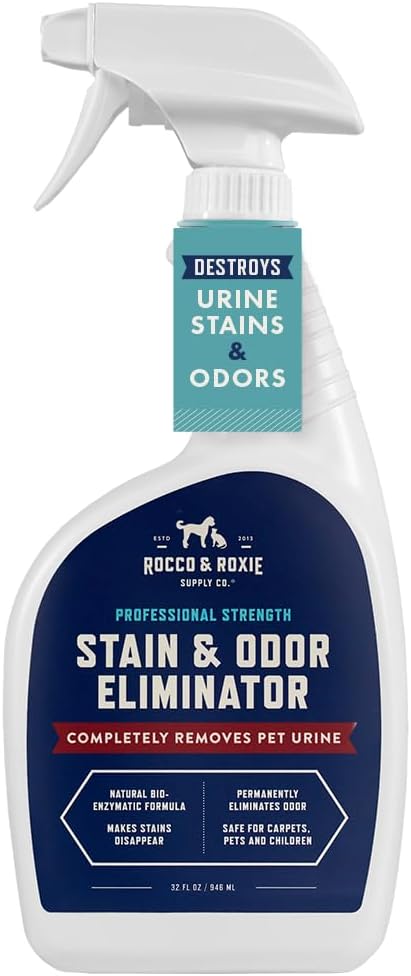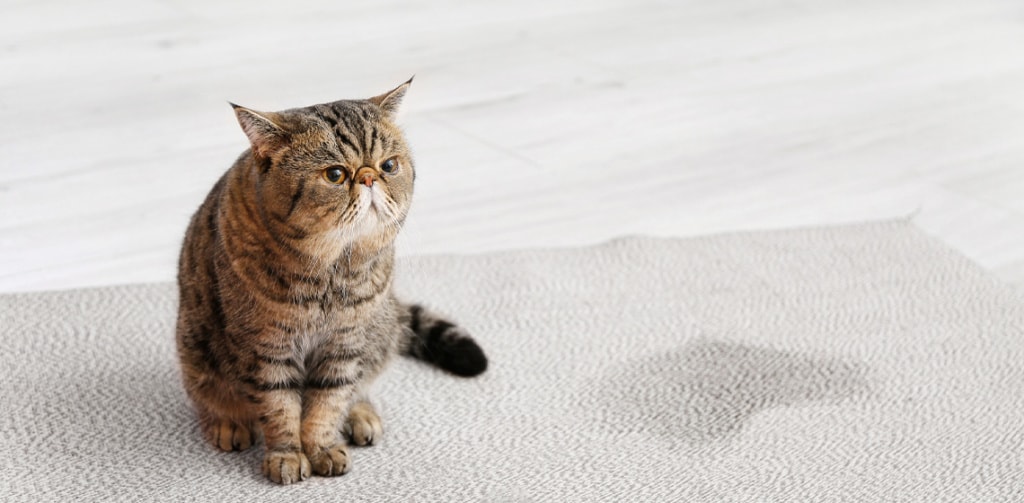We love our cats, but coming home only to be greeted by the distinctive smell of cat pee is enough to drive any pet parent crazy! Understanding how to effectively remove cat urine is not only essential for a clean and comfortable home but also helps to reduce the risk of your cat becoming a repeat offender. This article will discuss top tips on how to get rid of cat pee smell, as well as some of the more common reasons why your cat might be peeing outside the litter box.
Table of Contents
Why is my cat peeing in the house?
Understanding why your cat might be peeing on undesirable surfaces like your carpet, furniture, or bed linen, is crucial to resolving the problem. Medical problems such as diabetes, kidney disease, urinary tract issues, and arthritis, to name a few, can all be causes of inappropriate urination. This is why it’s always a good idea to book a vet visit if your cat has started peeing inside your home.
Other common reasons for inappropriate urination are behavior issues, such as stress and anxiety, or territorial spraying. Studies have shown that cats in multi-cat households are more likely to develop urinary issues than those that live alone. Cats also prefer to have access to a clean litter box at all times (who can blame them?), so being unable to access a clean tray could be another reason for accidents around the home. Remember there’s nearly always an underlying reason for your cat’s behavior – they’re not doing this out of spite or to punish you.
How to get rid of cat pee smell
Not only is the smell of cat pee pretty unpleasant, but cats are also more likely to urinate in the same spot again if the smell remains. Cats have approximately 200 million scent receptors, compared to only 5 million in humans, which is why effectively neutralizing the odor is so important.
Top Tips:
1. Timing is everything
The sooner you can clean up cat pee, the better, as, over time, bacteria begin to decompose chemicals within the urine, like urea, which gives off that nasty ammonia-like smell. Once cat pee has dried, it can also be a lot more difficult to locate the source of the smell!
2. Soak it up
Before going in with any cleaning products, start by using paper towel or a cloth to absorb and remove as much of the urine as possible.
3. Keep cool
Make sure to use cold water when cleaning up urine as heat can make the stain and odor more difficult to remove.
4. Avoid ammonia
Ammonia is produced when cat urine sits in the environment and contributes to its distinct smell. Ammonia-based cleaners may even encourage your cat to urinate in the same spot, as your cat associates the smell with stale urine. Choose ammonia-free cleaners to ensure you aren’t confusing your cat.
5. Don’t punish your cat
Remember there’s a reason why your cat is peeing inside. Finding out why will not only help prevent the problem in the future but is also very important for your cat’s overall health and happiness.
The sooner you can clean up cat pee, the better, as, over time, bacteria begin to decompose chemicals within the urine, like urea, which gives off that nasty ammonia-like smell.
The following products and home remedies are all non-toxic and have been recommended by veterinary experts. It’s still helpful, however, to keep your cat away from the area by closing off the room or placing an upturned laundry basket over the stain until it dries.
Enzyme cleaners
Also known as enzymatic cleaners or enzyme-based cleaners, these products break down urea and other chemicals in pet urine that produce odor. These cleaners are some of the best for removing the smell of urine to the point where your cat is also unable to detect it, reducing the chance of them re-marking the area. Enzyme cleaners should not be used with detergent or other cleaning products as these may deactivate the enzymes making them ineffective.
For effective odor removal, consider Rocco & Roxie Professional Strength Stain & Odor Eliminator.

Rocco & Roxie Supply Co. Stain & Odor Eliminator for Strong Odor, 32oz Enzyme Pet Odor Eliminator for Home, Carpet Stain Remover for Cats & Dog Pee, Enzymatic Cat Urine Destroyer, Carpet Cleaner Spray
118,008
$19.31
Baking Soda and White Vinegar
If you don’t have access to an enzyme cleaner, chances are you probably have baking soda or white vinegar in the cupboard. A solution of one part vinegar to one part water (1:1) is often recommended and should be blotted gently over the area. Though vinegar itself has a strong smell, this should disappear over a few days taking the stench of cat pee with it! Baking soda can also be sprinkled over dried stains, left sitting for a few hours, and vacuumed up to help neutralize urine odor.
Detergent and Club Soda
Another home remedy for getting rid of cat pee smell from the carpet comes from the Ohio State University College of Veterinary Medicine and uses dish detergent and club soda. First, soak the area with water mixed with a few drops of detergent. Let it sit for an hour or two, before gently blotting. Rinse with tap water on a sponge and then soak the area with club soda for 10 minutes. The team recommends leaving the area to dry overnight and following up with an enzyme cleaner if possible.
Whether purchasing pet cleaning products or using home remedies, it’s always worth doing a spot test before you need to use them to make sure they don’t stain, or lighten darker carpets and wood floors.
A solution of 1 part white vinegar and 1 part water can be used to neutralize the smell of cat pee. Soak the area then let it dry. The smell should disappear over a few days.
How do I stop my cat from peeing in the house?
If your cat is peeing in the house, a visit to your vet to rule out a medical problem is always a good idea. Your vet will also ask questions about your cat’s home environment and behavior to see if this could be the source of the problem. Something as simple as a change in the type of kitty litter you’ve purchased, or moving the tray next to the noisy washing machine could be enough to discourage your cat from using their litter box. Remember, cats like a clean litter tray and there should be one tray available per cat, plus a spare, at all times. For cats that spray, your vet will often recommend spaying or neutering (if this hasn’t been performed yet) or the use of pheromone diffusers and sprays.
FAQ
Cleaning up cat urine at the source is the only way to remove the odor from the air. Enzyme cleaners are best, otherwise, try home remedies such as white vinegar or baking soda. Scented sprays just mask the smell, leaving the urine stain on the carpet and encouraging your cat to toilet in the same place.
A solution of 1 part white vinegar and 1 part water can be used to neutralize the smell of cat pee. Soak the area then let it dry. The smell should disappear over a few days.
If your cat has peed on wood, immediately use paper towel or a cloth to absorb as much urine as possible. Follow with an enzyme cleaner safe for hardwood floors.

Ellen is an Australian vet who is currently combining her love of writing with traveling and working across the UK as a relief vet. Ellen graduated from the University of Melbourne in 2012 and is passionate about all things small animal health. Since graduating she has worked in clinical practice, including at a university teaching hospital in New Zealand. Ellen is currently based in Somerset and in her free time enjoys yoga, reading, travel, and modern calligraphy!








